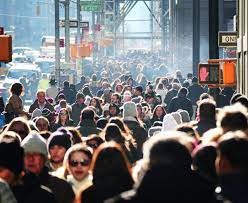Supreme Court Takes On Gun Rights Again. Will We All Be Packing Heat?
Nov 3 2021Eclipsed by the morning-after autopsies of the November 3rd elections, that the Supreme Court that same day took on an inflammatory gun rights case was barely noticed.
The case challenges a century-old New York state law that requires a resident to obtain a special license to carry a gun in public places by proving a "proper cause" for the need to do so. Seven other states — California, Delaware, Hawaii, Maryland, Massachusetts, New Jersey and Rhode Island have similar laws.
The complaint is from two men who have handgun licenses for 
hunting and target practice but were denied “unrestricted” licenses for self-defense. Officials said they could not demonstrate a “special need for self-protection distinguishable from that of the general community”. It has been presumed that the court, with its new 6-to-3 conservative majority, took the National Rifle Association-backed case to reinterpret the Constitution's Second Amendment's "right of the people to keep and bear arms" as meaning that people should not be overly restricted, or conceivably, that the right "shall not be infringed" at all. The questioning by the conservative members of the court made clear their leanings in that direction.
An amicus brief by 25 Republican senators urged that extreme. They say that the framers weighed the consequences and declared with finality that the right to bear arms needs no permission from officials.
Pulitzer Prize winning author and historian Garry Wills, writing in a 2017 New York Times supplement on the Constitution, would likely concur:
"Finding original intent is more complicated than just looking up words in dictionaries of the 18th century. It means re-entry into a lost world. Take the matter of the right to keep and bear arms. That is military terminology. One does not bear arms against a rabbit. "Arms" is itself a military designation. We do not normally say, 'I keep arms' when we mean 'I own guns'.
"Of course citizens had a right to own guns in the 18th century, to buy them and use them. That went without saying. There was no reason to declare in a Constitution, 'I have and will protect a right that everyone just took for granted'."
The reason for the amendment was to satisfy the states' demand that they be free to keep arms as in an armory for use with a militia should the need arise, is how that interpretation goes. States wanted the capability to immediately respond to threats, whether from Indian tribes, the British in Canada, the French in the West, slave rebellions in the South, or perhaps even from this new federal government should it overstep its bounds. the end of history? The case now heard by the court poses something of a test for the conservative justices if, in accord with their "textualist" and "originalist" doctrines, they want to hew to the amendment's language that "the right of the people to keep and bear Arms shall not be infringed". They will be ignoring a substantial historical record of controls on carrying guns in the public square. A “staggering array” of gun laws was enacted in the years after the Civil War imposing permit requirements and banning concealed carry, wrote a dozen English and American history professors in support of the New York law. They could have pointed to the Wild West and Tombstone, Arizona, where new arrivals to town had either to deposit their guns or register them with the sheriff. Today's America is thick with regulations that prohibit guns in courthouses, at airports, subways, bars, houses of worship, and so on.
When they were appeals court judges, two Trump additions to the court, Brett Kavanaugh and Amy Coney Barrett, both expressed support for reviewing the historical record. Kavanaugh wrote, "Indeed, governments appear to have more flexibility and power to impose gun regulations under a test based on text, history, and tradition than they would under strict scrutiny” of the Second Amendment. But both of them gave a nod to history while contending that the restrictions at issue were unconstitutional in the cases their courts were reviewing. Barrett wrote a dissent that said that only those shown to be dangerous may be stripped of their Second Amendment rights.
In today's proceedings, Barrett acknowledged that there are "sensitive places" where guns would be ill-advised, but went to the extreme of positing "Times Square on New Year's Eve is a sensitive place".reworking a precedentThe court has not dealt with guns since 2008's District of Columbia v. Heller, the first time it considered how the Second Amendment applied to an individual's right to possess weapons for uses such as self-defense. The 5-to-4 decision struck down D.C.'s ban on handguns and the city's requirement that owners keep lawfully permitted rifles and shotguns "unloaded and disassembled or bound by a trigger lock". The ruling said the "Arms" of the Constitution included individuals and their handguns and it thus decoupled the clause that grammarians would say restricted the bearing of arms to only their use in a "Militia…necessary to the security of a free State".
But while freeing use of guns for traditionally lawful purposes such as self-defense within the home, the court said the right is not unlimited and that gun ownership could still be regulated. Antonin Scalia’s majority opinion listed permissible restrictions such as ban on possession by felons and the mentally ill and in “sensitive places” such as schools and government buildings.
Getting rid of restrictions is pretty much what the brief of former solicitor general Paul Clement says, arguing for the plaintiffs:
“When the founding generation enshrined that right in the Constitution, it understood the right to entitle the people to ‘have arms for their own defence’ and ‘use them for lawful purposes’ wherever the need should ‘occur’.”
It is clear that the conservative majority on the court is going to say, given their questions and comment, that the New York law goes too far, that having to show a special need to carry a weapon is an unusual requirement to avail oneself of a constitutional right, inasmuch as we do not, with respect to the Fourth and Sixth Amendments, have to demonstrate a special need to head off search and seizure of our property, nor must we show a special need to exercise the right to confront one's accuser in court.
So does that mean freedom to carry a concealed weapon everywhere? Barbara Underwood, representing the state of New York, said people are terrified about the idea of people carrying weapons on the subway. But what about someone who works nights and has to take the subway home to a high-crime neighborhood, was Justice Samuel Alito's counter. Why shouldn't that person be able to carry a gun? We would ask, why isn't that a "special need" rather than, for the sake of the night worker, a blanket ruling that allows the packed daytime subways to be permeated with riders wearing concealed guns? In two hours of oral arguments, the entire concern was about rights with no concern for public safety.
But if the court takes an "originalist" position (a "textual" position is a joke, considering that the wording of the Second Amendment is endlessly sidestepped), it will make clear the absurdity of clinging to what suited the country some 240 years ago. The right of an individual to bear arms meant single shot pistols and muskets that a skilled rifleman could load, ram, and fire not more than four times a minute. The six-gun had not even been invented (1836). The Constitution's authors had no clue of what was to come. Here we are now, with 10,20,30-round high-capacity magazines fired continuously from fully automatic rifles capable of slaughter in the dozens. To decide that the "original" language of the Constitution should dictate "shall not be infringed" to us today is madness.
 If that's what the justices have in mind as they contemplate the New York case, they should pay a visit and imagine a future of walking the crowded sidewalks of New York City with care not to jostle those open-carry dudes looking for trouble.
If that's what the justices have in mind as they contemplate the New York case, they should pay a visit and imagine a future of walking the crowded sidewalks of New York City with care not to jostle those open-carry dudes looking for trouble.
Please subscribe if you haven't, or post a comment below about this article, or
click here to go to our front page.


The operative phrase in this newsletter is ” the entire concern was with rights with no concern for public safety.” After the road-rage shootings in California and having moved at the beginning of this year from New York State to Arizona (an open-carry state), I was concerned about drivers and others who might, willy nilly, take offense at something I did or that others did, and blow them away, or try to. The open and unrestricted ownership and use of any type of gun undermines fundamental public safety–and that’s the issue. I must say that having visited more than 25 restaurants since arriving in Tucson, I’ve only seen one man enter an eatery with a holster and a sidearm in it. Who knows who the “mentally deficient” or “mentally unstable” people are? I don’t. Neither do you, and neither do professional psychiatrists — until extensive exams have been performed. What about that impulsive instant where a person fires a gun at another for some real or imagined offense, and kills or wounds that person severely? Would I be any safer here in Arizona if I carried a loaded gun too? I doubt it.
The reason for the 2nd amendment as to allow citizens to resist overbearing government officials. There was an attempt by to ease the problem of tax collection in the mid 1760s by restricting the ability of citizens to bear arms. It was one of the things which created the consciousness of being “American” that led to the revolution of 1776.
When the bill of rights was penned, consciousness of the British tax collection abuses, and the dangers of standing armies and government monopoly of lethal force were still very much in consciousness. The 2nd amendment has nothing whatever to do with “hunting” etc.and everything to do with self-defence.